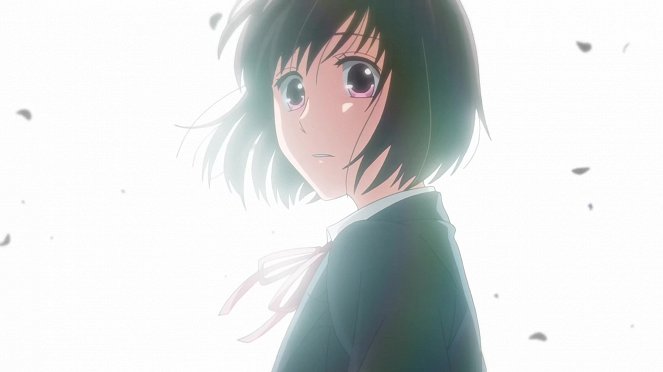Kamera:
Shinya MatsuiMusik:
Hiroaki TsutsumiBesetzung:
Yurie Kozakai, Toshiyuki Toyonaga, Jun'ya Enoki, Ryohei Kimura, Kana Hanazawa, 長谷川玲奈, Fumiko Orikasa, Mariko Honda, Jōji Nakata, Ryôko Maekawa (mehr)Streaming (1)
Folgen(12)
-
Warui hito de wa (E01)
-
Kósui no nioi (E02)
-
Karakatterun dža (E03)
-
Seinaru joru ni (E04)
-
Seiči džunrei (E05)
-
Kataomoitte (E06)
-
Oši e no ai (E07)
-
Suki na hito wa... (E08)
-
Džibun no kotae (E09)
-
Kizucuku kakugo (E10)
-
Kókósei (E11)
-
Kimoči warui (E12)
Inhalte(1)
One rainy day, salaryman Amakusa Ryo is saved by a high school girl he doesn't know at the station. He later finds out that the girl is Arima Ichika. Ryo is somewhat of a womanizer and to repay her for saving him, he suggests giving her a kiss or going out on a date with her, in which Ichika tells him he's creepy. This, however, opens a new door for Ryo and he falls madly in love with her. Ever since then, Ryo tries to overly express his feelings to Ichika. Ichika just keeps insulting him and says he's being creepy, but he just seems to take it as her way of showing affection towards him... (Crunchyroll)
(mehr)Videos (1)
Kritiken (3)
Koikimo, oder im Englischem "It's Disgusting to Call This Love" schlittert völlig bewusst auf dünnem Eis und erzählt eine Geschichte eines 27-Jährigen Mamnes und einer 17-Jährigen Studentin. Ein äußerst interessantes Thema, welches nicht jedem passen wird und das bei einigen Zuschauern gewisse logische Antipathien hervorrufen wird. Wir haben es hier mit einem größeren Altersunterschied zu tun und gleichzeitig mit einer romantischen Beziehung zwischen einem volljährigen erwachsenen Mann und einem minderjährigen Mädchen, und das ist sehr umstritten. Und dessen ist sich der Anime an manchen Stellen durchaus bewusst und arbeitet im Grunde recht glaubhaft mit den damit verbundenen Problemen, zumindest auf der „Vernunft- und Gefühls“-Ebene. Aber es bleibt dabei, dass es keinen Sinn macht, sich das anzuschauen, wenn einen die Prämisse an sich stört, denn es wird die Meinung zu ähnlichen Beziehungen wahrscheinlich nicht ändern und es wird wie eine weitere Variation des altbekannten „Liebe kennt keine Hindernisse“ Thema erscheinen dem man in diesem Zusammenhang wahrscheinlich nicht wirklich glauben möchte. Und es ist im Grunde nichts anderes als eine ziemlich gewöhnliche und passable Liebesserie, die wahrscheinlich nur von dieser Kontroverse geprägt ist, wenn ich einfach meine Meinung ändern würde, würde ich ungefähr 50% des Inhalts verlieren und was übrig bleiben würde, wäre eine öde abgedroschene Liebeskomödie. Anfangs hatte ich keine Lust dazu, schließlich habe ich mich gefragt, ob das ein Thema ist, das ich irgendwie angehen möchte, zumal auch Higehiro in dieser Saison noch erscheint. Außerdem hatte ich nach den ersten paar Folgen den Eindruck, dass der Hauptcharakter sehr aufdringlich und hartnäckig ist, was mir (wie auch dem Hauptcharakter) nicht sehr sympathisch war. Aber mit der Zeit hat sich herausgestellt, dass sogar die Autoren davon wissen, es absichtlich dort eingefügt haben und damit arbeiten wollen – sogar der Hauptheld merkt es. Es ist, als könnten sie Probleme schaffen, von denen sie wissen, dass sie den Zuschauer stören sollten, und dann versuchen sie diese irgendwie zu verarbeiten und die Kanten abzurunden. Ja, aber ist das bei solchen Themen überhaupt in Ordnung? Wäre es nicht besser, wenn die Serie mich lehren würde, wenn jemand aufdringlich wie eine Hornisse im Arsch ist, dann sollte ich ihn sofort und resolut zur Hölle schicken, anstatt ihn nach und nach in meinen Kopf und in mein Herz lassen? Andererseits stellt sich heraus, dass der Hauptheld seine unbestreitbaren Qualitäten hat, und hält man durch, denkt man mit der Zeit sogar, dass es eigentlich recht gut ist. Vor allem bis zum Schluss funktioniert das alles und die Charaktere verhalten sich recht logisch und angemessen, kurz gesagt, für mich hat es am Ende ziemlich an allen meinen imaginären Kanten geschliffen, auch wenn die gewisse Unsicherheit um die Hauptprämisse und ihre Kontroversen bei mir immer noch bestehen. Ist es also ekelhaft, so was Liebe zu nennen? Wahrscheinlich nicht, hier ist es nicht derselbe Fall wie bei Christian von Boetticher, der mit einer 16-Jährigen zusammen war. Außerdem kenne ich mindestens einen hoffnungslosen Romantiker, der bereit ist, Liebe in viel seltsameren Formen zu bewundern als es hier der Fall ist, also werde so engstirnig wahrscheinlich wieder mal nur ich sein. Schließlich kann ich mich immer noch irgendwie nicht damit abfinden, dass ich solche Beziehungen bejubeln soll, die ich nicht als sehr ausgewogen empfinde, aber genau wie das Gesetz kann ich sie wohl unter Umständen tolerieren. Nun, wenn wir die Kontroverse kurz vergessen, haben wir eine passable Romanze, ziemlich sympathische Charaktere, die sich entwickeln, eine durchschnittliche Animation wie auch Musik, also ist die Rede von einer ziemlich guten Erfahrung. Wenn ich meine Verlegenheit und eine gewisse Ablehnung des Themas hinzufüge und dafür einen Punkt abziehe, weil sie für mich doch nicht so dramatisch sind (schließlich ist nichts Unangemessenes passiert), dann kann ich dieser Serie in aller Seelenruhe die 6/10 geben.
()
(weniger)
(mehr)
Can persistent romantic conquest in X number of ways bear the desired fruit (except pineapples on pizza) and love? Koikimo will try to show and prove that it's not impossible, even if the age difference between the actors pushes the boundaries of social acceptance. Our cup is overflowing with the age-gap theme and I'm not against it in any way, it just needs caution, as clumsy handling would result in the worst possible audience reception. If there's anything Koikimo fails at that in my eyes that really bothers me, it's the repulsive character of the all-powerful Jesus-kuns and the boundless stalking. The two come together in the main character of the mildly narcissistic Ryo, who the freaking series unabashedly criticizes in a rather cheap and mechanical way from the very beginning. He reminded me of a similarly uncomfortable Takumi Usui from Maid Sama!, but unlike that yucky slimeball, Ryo was pleasantly aware, socially sophisticated, and sycophancy was non-existent in his vocabulary, so despite his insufferable intrusiveness, I was able to turn a blind eye to him. The disproportionate reaction to his behavior was saved by his coveted teenage Ichika, who overcomes him with a healthy dose of flamboyant innocence and stubbornness, leaving the pieces in constant civilized check. Koikimo is, after all, incredibly consistent, with all the pros and cons that entails. From the first minutes, the dice are rolled, the playing field is firmly set, and the anime never, ever tries to screw the viewer over. On the flip side, from the opposite angle, the plot never encounters even a single bump in the road, the characters don't engage in any deviousness, and so after the first episode, the bookies couldn't even calculate the odds on how it all turns out because it's so unhappily obvious. I can't even say I laughed uproariously, but a couple of cute gags satisfied me, and every now and then I found myself longingly lifting my tonsils or, conversely, stroking a more sentimental heart. Ultimately, the biggest plus of the whole piece is that I never felt insulted or demeaned as a viewer and I found the script surprisingly intelligent and charming (though the ending classically began to have hints of minor nonsensical decisions). The characters and their relationships don't overdo it and play 100% fair; did I really not find even a single more awkward moment? Wow! I have minor admiration for the mediocre character design and deteriorating animation around episode 10, but you couldn't expect any miracles from the smaller studio Nomad. Koikimo is far from brilliant and it hardly discovers America; a more thematically conservative audience might well take offense at it, but I never found myself in the drop waters and I’m walking away moderately satisfied. A very close and highly subjective 4 stars, because it's not disgusting to call this a decent anime.
()
The first two or three episodes were great, fun, it went by nicely. But then it slipped into the old classic and it wasn't as interesting to me. Suddenly it lost the specialness for me that drew me to this anime. Sure enough, it was still an enjoyable show, innocent and gripping. And yet the animation was really terrible; I didn't like the character designs and the way they tried to move the scene around at all costs, the backgrounds to make it like NPCs from Vice City were walking around... I think it was unnecessary and spoiled the impression. Static backgrounds are fine in Shōjo stuff, at least they don't steal the spotlight from the drama happening to the characters. In terms of the characters, they were fine, not everyone was original, but they worked together pretty well, their chemistry was ok and no one was over the top. But because I expected and wanted more comedy from this... Just a three, not a touch more.
()

